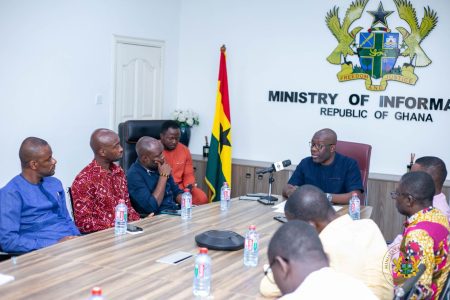Government has initiated discussions with key stakeholders in the healthcare sector to address the pressing issue of dialysis treatment costs for renal patients.
The dialogue, which commenced in a meeting with the Private Health Facilities Association of Ghana (PHFA), aims to explore effective measures for reducing the financial burden on patients requiring dialysis treatment.
Minister for Information, Kojo Oppong Nkrumah who opened the dialogue shed light on the government’s commitment to this critical matter.
This comes on the back of concerns about dialysis fees and how patients are finding it difficult to pay for their regular sessions.
Dialysis is a treatment process that helps one’s body to remove extra fluid and waste products from the blood when the kidneys are not able to.
3 dialysis sessions per week
Patients require dialysis three sessions per week to have a normal life.
5m Ghanaians suffering from kidney problems
Some 17% Ghanaians representing over five million people are suffering from kidney problems.
15,400 require dialysis in Ghana
Out of this number about 15,400 patients require dialysis.
Only 1,195 on dialysis treatment
However, only about 1,195 people, representing 7.8% of the estimated number, are receiving the life-saving treatment.
Dialysis is supposed to be done three times a week, but due to the cost involved, most patients are having it once a week.
Tissue transplant legal framework urgently needed
Experts care calling on government to put in place the necessary legal frameworks to enhance options for kidney transplants rather than patients being on dialysis, which is more stressful.
President Nana Akufo-Addo tasks team to find solution
Oppong Nkrumah disclosed that President Nana Akufo-Addo has instructed health authorities to thoroughly examine the challenges surrounding dialysis expenses and propose solutions.
The National Health Insurance Authority (NHIA) and the Ministry of Health are leading the process to make recommendations in the coming weeks which will play a pivotal role in determining government’s course of action.
“The input that you’re sharing with us today, I’m giving you the assurance that it will find expression at the table when those considerations are being made,” the Minister said.
Key figures from the PHFAoG in attendance included Vice-President Samuel Boakye Donkor, Eastern Regional Patron Dr. Yaw Osafo, and Ashanti Regional Patron Samuel Boakye.
Mr. Donkor highlighted the challenges posed by high importation duties on medical equipment, particularly dialysis machines.
He urged the government to consider either incorporating dialysis costs into the National Health Insurance Levy (NHIL) or establishing a dedicated levy to alleviate the financial strain on renal patients.
Dr. Osafo drew attention to the unequal distribution of dialysis centers in Ghana, with the majority concentrated in the Greater Accra and Ashanti regions.
Integrate dialysis centers into Agenda 111 hospital
He urged the government to integrate dialysis centers into the Agenda 111 hospital project, ensuring that dialysis services become accessible at the district level.
Mr. Boakye emphasized the urgency of revitalizing the health sector and suggested that with government support, private health facilities could significantly reduce the cost of importing medical equipment by up to 40%.
In response, Oppong Nkrumah assured the stakeholders that their concerns would be presented to Cabinet for government’s intervention.
He said government is taking proactive steps to find sustainable solutions to the challenges faced by renal patients and healthcare providers across the country and in due time, some interventions will be done.
Dialysis situation at Korle Bu
Korle Bu Teaching Hospital attends to 350 patients and runs 2,000 sections of dialysis every month.
The hospital charges GH₵380 for dialysis treatments which it said is not sufficient to meet the cost involved resulting in GH₵961,000 shortfall each month.
Exchange rate fluctuations and the high cost of importing dialysis equipment have made it difficult for Korle Bu Teaching Hospital to break even.
Due to the shortfall 45 dialysis machines of Korle Bu Teaching Hospital are being held by suppliers.
Following this situation Korle Bu Teaching Hospital proposed to increase dialysis cost to GH¢765.14 but it was met with public anger.
14 registered dialysis centres in Ghana
There are only 14 registered dialysis centres in the country, the Health Facilities Regulatory Agency (HeFRA) has said.
Out of the 14, seven are public and seven are privately owned.
These are the Riverwoods Medical Equipment and Dialysis Company, the Accra Kidney Clinic Limited, Sahel Health Ghana Limited, the Kidney Specialist Center LTD, Eastern Regional Hospital, Effia Nkwanta Regional Hospital and Central Dialysis.
The rest are the Komfo Anokye Teaching Hospital, Korle-Bu Teaching Hospital, Tamale Teaching Hospital, Maritime Hospital Ghana Limited, First Dialysis, Sage Medic Center, and Peace &Love Hospitals.
Eight of the facilities are in the Greater Accra Region, three are in the Ashanti, Northern-1, Eastern -1, and Western Regions.
For a facility to acquire a license to operate dialysis services, it is expected to at least meet the minimum requirement of two dialysis machines, two dialysis beds, a water treatment plant, a BP apparatus per machine, and an emergency trolley with emergency drugs.
In spite of the high number of End Stage Renal Disease (ESRD) or kidney failure patients in the country, there are only 10 Nephrologists in the country.
A nephrologist is a doctor who specialises in diagnosing and treating kidney conditions.
- Oquaye Report to revitalise NPP for 2028 – Bawumia - 24 April 2025
- Thursday, April 24, 2025 Newspaper Headlines - 24 April 2025
- Govt grants Gold fields 12 months to handover Damang Mine - 23 April 2025

